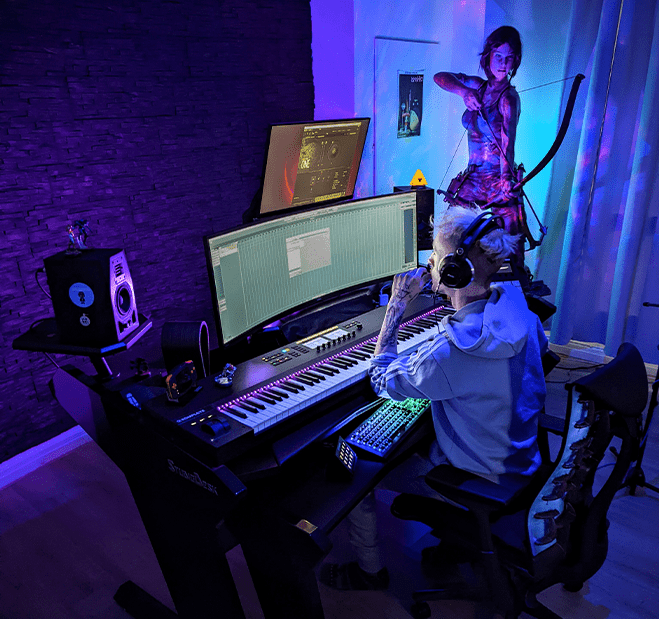Tobi Weiss is one of the few composers of game music who gives insight into his world on Instagram – and it is a world that’s multilayered, highly creative and well-thought-out. His expertise goes far beyond composing pretty melodies for games. With Tobi’s knowledge about all the techniques and possibilities to transform virtual worlds into music, he creates powerful elements for games.
„As a child and teenager, I played games a lot. That’s why I always had a connection to the gaming world”, tells Tobi Weiss. When he was 20 years old, he decided to turn his hobby into a profession. He didn’t become a game developer though but a composer for game music because music also was a fixture in his youth. After studying music production, there was a lot of learning-by-doing and he did gigs as a backliner for festivals as well as various mixing jobs for years. “The first seven or eight years were really difficult. By day I worked different jobs and at night I created music for non-budget video games projects with students or for short films. That’s when I applied all my theoretical knowledge. Just studying isn’t enough. When you choose this job, you have to be up for sitting your ass down and really do something.”

And Tobi did a lot: “Over the years I analyzed and recreated dozens of gaming soundtracks to understand how it works and what the composers were thinking. Today, in this special profession it’s the last USP to know more than anyone else in this area. All the other jobs that I did – and even still do from time to time – are very valuable to gain a lot of different experiences and to get more jobs. In this industry, it’s very common that things don’t happen directly but via connections. As soon as you get the chance, you have to deliver perfectly or at least as good as you can.” Tobi tells that with game music it’s not only about a great sound but also about understanding the techniques that can and should excite on an adaptive level.
Tobi starts out to develop a game soundtrack by writing a concept based on information such as artwork, colors, genre, level of difficulty, characters and background story. “Sure, it does work to just put strings playing staccato and a few drums on a fighting scene but a lot of potential gets lost this way – that’s the difficulty here. I don’t like to use instruments just because they sound cool. I really want them to make sense. For the concept, I think about which instrumentation works for this world and create instrumental guiding themes. From there I can probably establish musical guiding themes. In the past, I created a lot of crazy guiding themes but now I know that a simple one is enough most of the time, if you use it well – for example one that’s connected to the slow collapse of a world. I write down all of this, plus, a rough estimation of how many tracks are needed and which dynamic elements via layering and branching exist.” This concept is Tobi’s basis that helps to show the developers all the possibilities. “It’s a fallacy to think that game developers have notion of game music – most of the time, they don’t know about all the possibilities. Since music doesn’t sell games in the first place, it’s sadly not on top of the priority list. That’s why developers are spending 50 Euros on it and thereby throwing away huge potential. Music keeps people playing because of its memorability. It also can be crucial for customer engagement and it enhances the immersive experience immensely.”

A lot works on an unconscious level with game music, says Tobi, and that this is a universal language. “The best elements of a game soundtrack do not stand out immediately, people like them without knowing exactly why. It should be avoided to place as much music as possible into the forefront of every scene because music should almost always play a supporting role that replaces silence – silence itself is a powerful tool that is hugely underestimated.”
Tobi doesn’t only compose the music for games but mixes it as well. Although he enjoys creating music much more than mixing it, he doesn’t want to outsource this part. On one hand because he isn’t ready to leave this part of the process to others yet, and on the other hand because mixing is important for his creativity. Tobi explains: “I often work with a lot of instruments, especially in the middle of the process. I throw in a lot of ideas, thin out – and repeat this. While I am doing so, I want the music to already sound decent. I want a kind of rough mix to be able to judge better how it sounds in the end. By now, I go about it quite intuitively but in the past I had to take great care to not end up with a strange mush. I mainly work with coloring EQing, I do the surgical, cleaning EQing constantly along the way.”

The plug-ins by sonible are a fixture in Tobi’s mixing process that hardly ever needs a limiter, but an EQ and compressor. “When I create a new track, smart:EQ 3 is always part of it as a preset. Especially for my workflow, that requires a track to sound good on the way to the final product, it’s super practical. I can really save a lot of time with it and I like the interface of smart:EQ 3 a lot because it’s intuitive and the plug-in just suits my work approach.” The possibilities the smart functions open up are an absolute win for Tobi: “I would be quite dumb not to use the intelligent algorithms that are able to ease my workload and do the groundwork. For my way of working, it’s just ideal.”